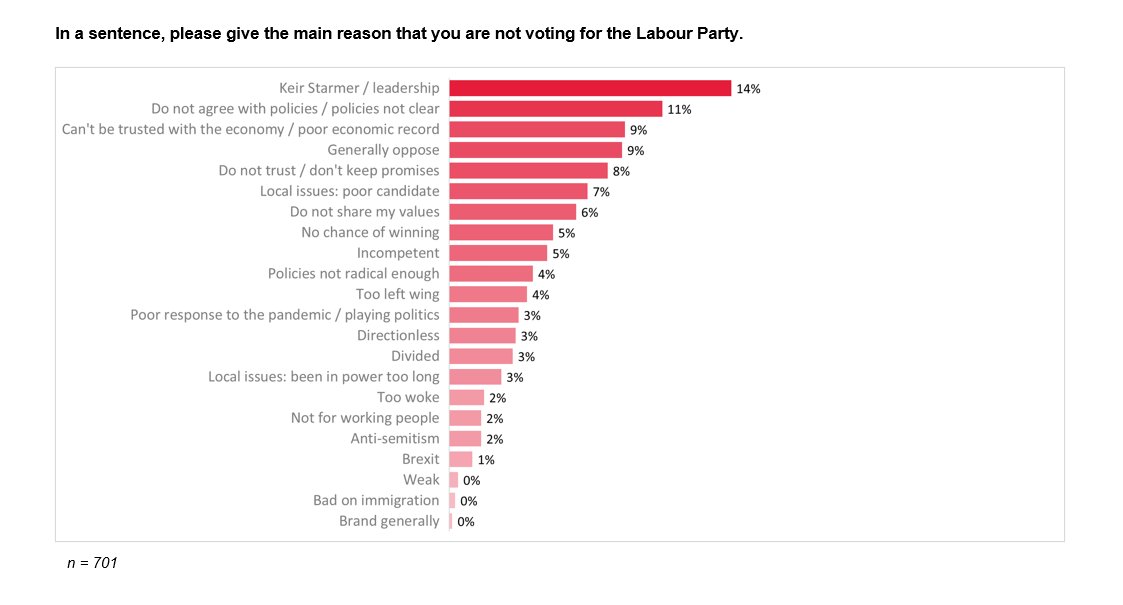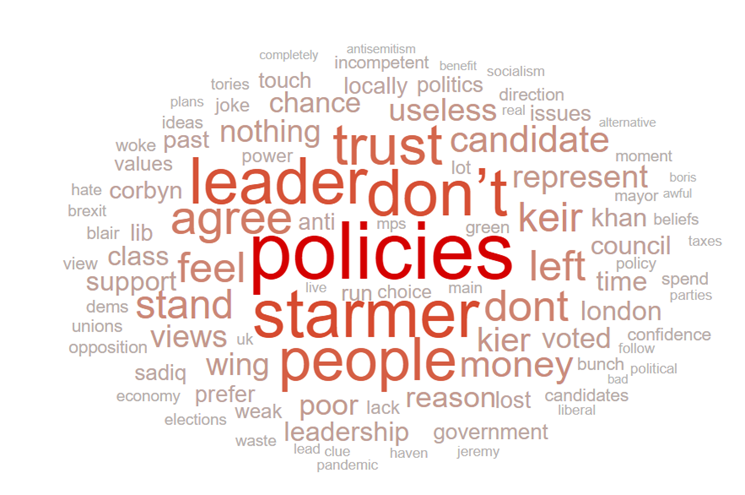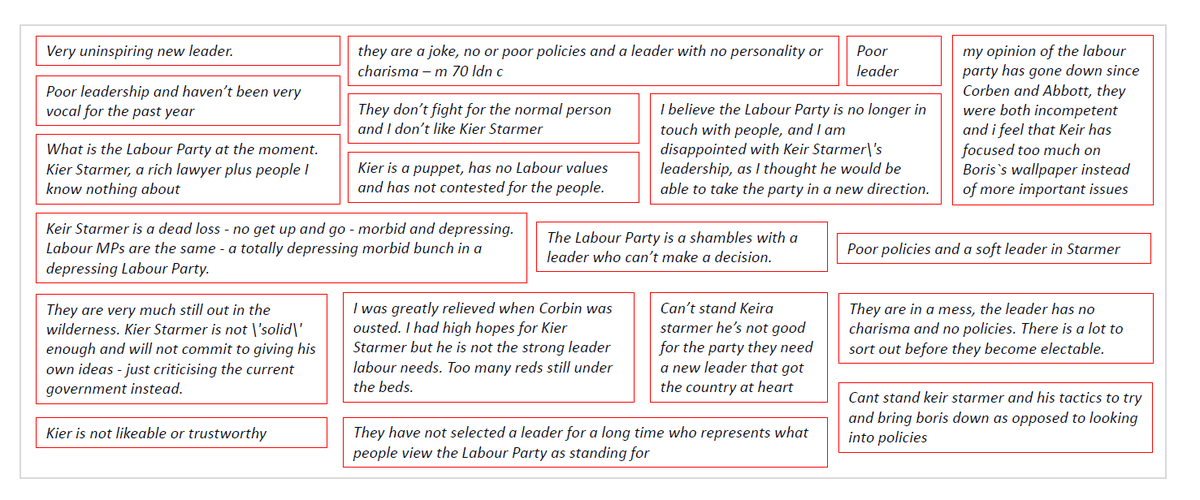
In some of our focus groups this week, I asked voters about Boris Johnson.
First, people who voted Conservative for the first time in 2019, in the 'Red Wall' seat of Bolton North East:
“He’s a coward.” (1/18)
First, people who voted Conservative for the first time in 2019, in the 'Red Wall' seat of Bolton North East:
“He’s a coward.” (1/18)
“I quite liked him at the beginning. I felt confidence during the pandemic, and that he was doing the best for all of us. Now, it’s like, we’ve been made a fool of.”
“He seemed like a bit of a character. I thought give him a chance. But it’s definitely changed my opinion.” (2)
“He seemed like a bit of a character. I thought give him a chance. But it’s definitely changed my opinion.” (2)
“I liked him because he was a bit different to the David Cameron, Eton-educated typical Tory. There was something about him that made him a bit more personable to me. It’s gone now, because we’ve lost that trust in him. Now he’s just a buffoon.”
“He can’t be trusted.” (3)
“He can’t be trusted.” (3)
“I think for me it’s more that, it’s one thing doing what he’s done, it’s the fact he did it and then said nothing had happened. He’s only come out and admitted it, under pressure in the Commons, when he’s been found out. So he’s lost all that credibility. He’s a liar, now.” (4)
“It’s the fact that he lied. If he turned round and said “yep, I’ve done it, I’m sorry,” that would have been okay. But he lied. What else has he been lying about?”
“I think he’s completely lost everyone’s trust.” (5)
“I think he’s completely lost everyone’s trust.” (5)
“He needs to resign. He has lost all integrity and all trust. How can he carry on leading people? How can you trust him?”
“I don’t really see how he can carry on, he’s offended so many people doing this, so many people.”
“For me, voting Conservative is less likely.” (6)
“I don’t really see how he can carry on, he’s offended so many people doing this, so many people.”
“For me, voting Conservative is less likely.” (6)
“They’re all up there backing him, most of them. That’s my worry now, with the Party. ‘Oh he’s apologised, let’s just get on with the job’. No – you’ve lied about doing the job.”
“The rest of his Party, apologising and saying they are going to back him. How can you?” (7)
“The rest of his Party, apologising and saying they are going to back him. How can you?” (7)
“My concern is, if all the Conservatives are now standing behind him, do we have the confidence in them? Are they just going to sweep it all under the rug too?"
Everyone had voted Tory in 2019. Asked if they would vote for Boris again now, not one person put their hand up. (8)
Everyone had voted Tory in 2019. Asked if they would vote for Boris again now, not one person put their hand up. (8)
We also spoke to people who are long-term Conservative voters in both Bolton, and also Cheltenham, a southern marginal that the Tories currently hold:
“If there was an election now, and Boris is still here, I wouldn’t vote Conservative.”
“It’s appalling.” (9)
“If there was an election now, and Boris is still here, I wouldn’t vote Conservative.”
“It’s appalling.” (9)
“I did have respect for Boris, with the vaccine rollout... But as times gone on, more stuff has come out of the closet. I think he’s a bit of a chancer now.”
“He shouldn’t be doing the job he’s doing. I just hope he goes. Whoever takes his place would be better than him.” (10)
“He shouldn’t be doing the job he’s doing. I just hope he goes. Whoever takes his place would be better than him.” (10)
“He’s a good speaker and a good orator. Behind that, I always felt he was lacking a bit. To me, it’s proven he was more than lacking.”
“It’s more the fact that he tried to bluff it – it’s the fact he treats us like fools, that he wouldn’t come clean with it.” (11)
“It’s more the fact that he tried to bluff it – it’s the fact he treats us like fools, that he wouldn’t come clean with it.” (11)
“He running the country at the time. If you can’t lead by example, you can’t lead.”
“He hides behind this buffoonism of his, that he can get away things if he apologises.”
“Now he’s got Brexit done, I don’t think he’s the person to model the party for the future.” (12)
“He hides behind this buffoonism of his, that he can get away things if he apologises.”
“Now he’s got Brexit done, I don’t think he’s the person to model the party for the future.” (12)
“For me it really hurt. I had to work on a Covid ward, it wasn’t my usual job, I was frightened to death. And to find they were doing that, it’s just disgusting.”
“I think he’s got to go.”
“There are better qualified people in the party to run it, with better credibility.” (13)
“I think he’s got to go.”
“There are better qualified people in the party to run it, with better credibility.” (13)
“He was maybe the right person to help us through Covid and Brexit, but now – now we’ve got inflation, and all these economic pressures – we don’t need Boris now, we need someone with a bit more of a steady hand and some gravitas. I think he’s lacking gravitas.” (14)
Focus groups are not intended to be representative. But they do tell us what might be behind the movements we see in the polls.
A few points:
- Criticism of lockdown parties is now spreading into a general view of Boris and his fitness to govern - perhaps irreversibly so. (15)
A few points:
- Criticism of lockdown parties is now spreading into a general view of Boris and his fitness to govern - perhaps irreversibly so. (15)
- This applies to both people who voted Tory for the first time in 2019 (a key group for the Conservatives to win) and long-term Tories.
- Words that were usually the reserve of Boris' critics like 'liar' are now being used regularly by these voters. (16)
- Words that were usually the reserve of Boris' critics like 'liar' are now being used regularly by these voters. (16)
- The almost-universal call for him to resign is coming from different angles. For some it's anger, for others it's a calmer case of 'do the right thing'.
- Other Tory figures & the broader party are now getting sucked into the unpopularity for defending the PM. (17)
- Other Tory figures & the broader party are now getting sucked into the unpopularity for defending the PM. (17)
- For most, cover-up rather than the deed itself has done the most damage to Boris' personal brand.
This means the current defence (blame others / work party excuse) is unlikely to work with the public - and may even make things worse. (18/18)
This means the current defence (blame others / work party excuse) is unlikely to work with the public - and may even make things worse. (18/18)
• • •
Missing some Tweet in this thread? You can try to
force a refresh












